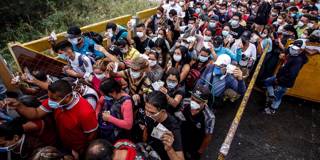COVID-19 has intensified our dependence on local communities, and we are riveted by stories of community resilience in the face of an unseen peril. But will we be able to think broadly and deeply enough to muster the commitment needed to confront the plight of distant strangers?
PRINCETON – COVID-19 has renewed the significance of locality in our lives. Social isolation and, in many places, the limits of national authority have highlighted the importance of close-to-home resources and bottom-up solutions to an invisible menace. International trade and travel have brought the virus into our neighborhoods and workplaces, but regional and local health services have had to mobilize to contain the pandemic.
Not surprisingly, we are riveted by stories of community resilience in the face of an unseen peril. We observe this acuity and resourcefulness in the daily briefings of US state governors and see it in the forbearance of neighbors and the sacrifices of health-care workers. National figures? Not so much. We continue to tell ourselves, “The world is a dangerous place. Thank goodness for neighbors and local authorities and institutions.”
Yet the crisis we are facing is fundamentally global. If we breathe a sigh of relief as the contagion crests in China, France, or the United States, and resume our pre-pandemic lives, we won’t be prepared when the next outbreak occurs on distant shores. We cannot turn our backs on the destiny of people beyond our borders. If we do, the global health and economic crisis will become a moral crisis of globalization.

PRINCETON – COVID-19 has renewed the significance of locality in our lives. Social isolation and, in many places, the limits of national authority have highlighted the importance of close-to-home resources and bottom-up solutions to an invisible menace. International trade and travel have brought the virus into our neighborhoods and workplaces, but regional and local health services have had to mobilize to contain the pandemic.
Not surprisingly, we are riveted by stories of community resilience in the face of an unseen peril. We observe this acuity and resourcefulness in the daily briefings of US state governors and see it in the forbearance of neighbors and the sacrifices of health-care workers. National figures? Not so much. We continue to tell ourselves, “The world is a dangerous place. Thank goodness for neighbors and local authorities and institutions.”
Yet the crisis we are facing is fundamentally global. If we breathe a sigh of relief as the contagion crests in China, France, or the United States, and resume our pre-pandemic lives, we won’t be prepared when the next outbreak occurs on distant shores. We cannot turn our backs on the destiny of people beyond our borders. If we do, the global health and economic crisis will become a moral crisis of globalization.